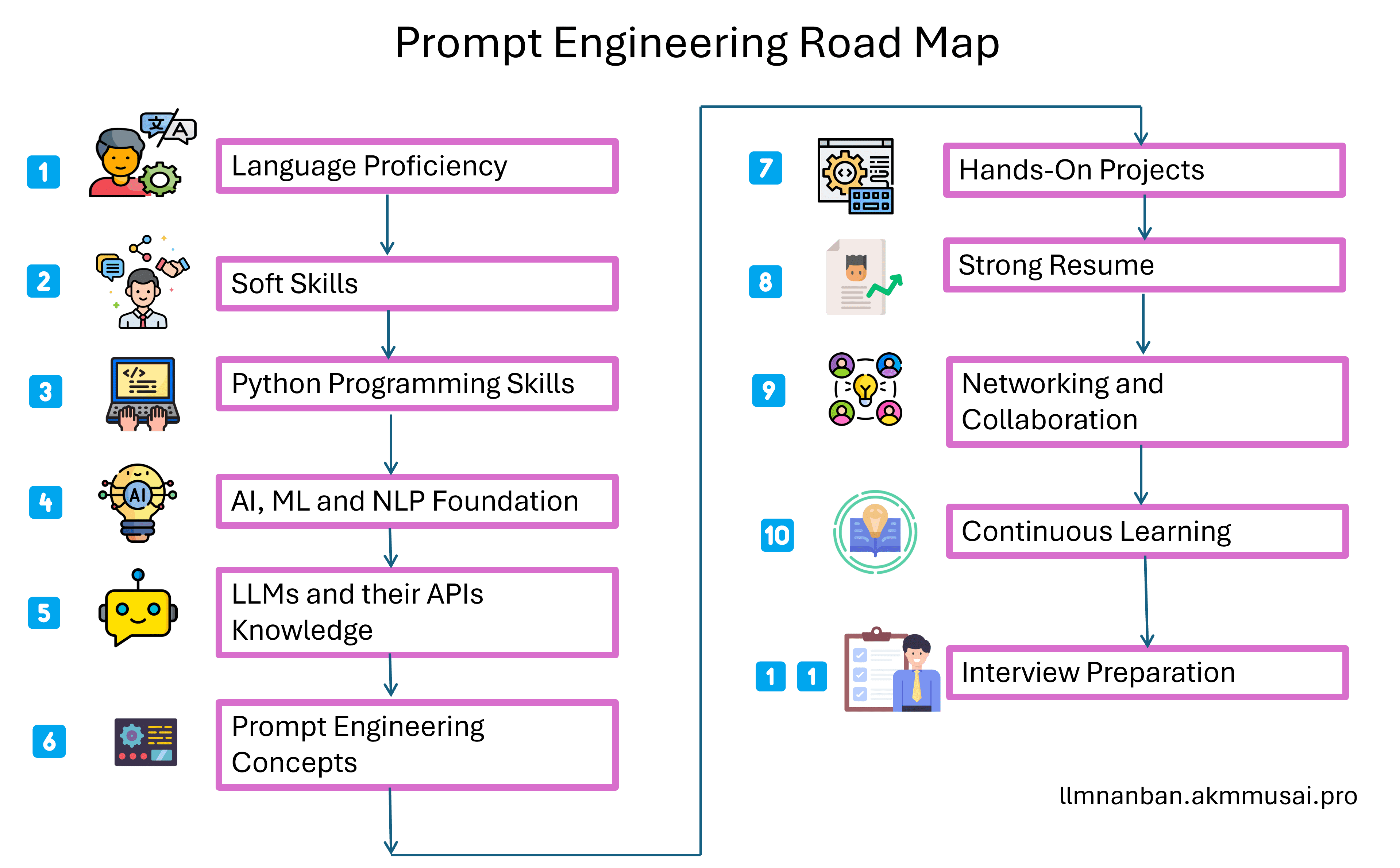🍰 Prompt Engineering Road Map
Abstract
This chapter covers the road map for Prompt Engineering.
🦜 Video lecture for this chapter - Link
Prompt Engineering is the science and art of writing and refining prompts to unlock the power of LLMs and get the desired output. Prompt Engineering requires multiple technical and non-technical skills. Here is the road map to start your journey with prompt engineering:

- 1️⃣
Language Skills -
Prompts are written in English or any other natural language we use in our daily communications. Good language skills including vocabulary, grammar, and syntax, is essential to craft precise and informative prompts.
- 2️⃣
Soft Skills -
Prompt Engineering requires multiple soft skills like good communication, problem-solving abilities, critical thinking, adaptability, time management, patience etc to have a smooth and effective work flow.
- 3️⃣
Python Programming Skills -
Proficiency in programming especially Python language is essential for prompt engineering. Good Python programming skills empowers to enhance your project work flow by writing scripts to automate prompt generation and testing, leverage LLM APIs, build custom tools and interfaces etc.
- 4️⃣
AI, ML and NLP Foundation -
Large Language Models are essentially AI models built on the top of concepts from natural language processing and machine learning. Have a good foundation in AI, ML and NLP is essential to proceed further.
- 5️⃣
LLMs and their APIs Knowledge For a prompt engineer, it is essential to have a good knowledge of LLMs and theirs APIs. Here LLM knowledge refers to underlying architecture, model training and inference etc and API knowledge refers to API documentation, authentication, rate limiting, and effectively integrating LLMs into applications, services, or products to generate meaningful and contextually relevant responses.
- 6️⃣
Prompt Engineering Concepts Writing effective prompts requires you to have a solid foundation in various prompt engineering concepts like prompt, prompt elements, prompt designing, prompt refining, different prompting techniques etc.
- 7️⃣
Hands-on-Projects -
Once you are familiar with Python, LLMs and prompt engineering concepts, the next step is to gain hands on experience by doing some LLM projects or building interesting LLM apps using libraries like LangChain or Llama Index. These hands-on-projects not only enhances your knowledge but also adds a lot of value to your resume.
- 8️⃣
Strong Resume -
Tailor your resume to highlight skills related to generative AI, prompt engineering, and NLP. Showcase your projects, technical expertise, and any relevant work experience. Highlight the tasks you've tackled, the challenges you've overcome, and the outcomes you've achieved.
- 9️⃣
Networking and Collaboration -
Attend conferences, workshops, and meetups to network with professionals in the field. Collaborate with researchers, data scientists, and engineers on larger projects to gain exposure to diverse perspectives and expertise. Building connections can open up opportunities for collaboration and knowledge exchange.
- 🔟
Continuous Learning -
As prompt engineering is an evolving field, continuous learning and staying updated with latest research and best practices are essential. Follow key conferences like ACL, NeurIPS, and EMNLP. Participate in online forums, discussion groups, or communities related to NLP and prompt engineering. Engage with peers to share insights and learn from others.
- 1️⃣1️⃣
Interview Preparation -
Practice answering technical and behavioral questions in mock interviews. This will help you articulate your experiences and problem-solving approaches effectively. Moreover, familiarize yourself with companies in the generative AI space. Understand their products, projects, and the role of prompt engineering within their applications.